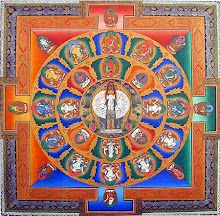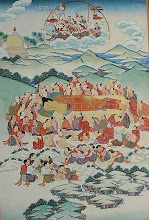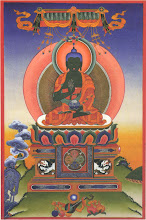by Venerable Wu Ling, an American Buddhist nun.
WORLD UNREST: EVERYONE’S BUSINESS
In the past year our world changed irrevocably. It will never be the same. And we will never be the same. In the United States, on the 11th of September, several thousand people died. They died in New York, in Washington, in Pennsylvania. They died because someone wanted revenge. They died because people do not understand that the consequences of everything we do will come back to us. If we kill, we will in turn be killed. If we destroy the security of others, we ourselves will not be safe.
SOURCE OF ANGER
If, out of our anger, we seek revenge thinking that it will solve our problems, we are tragically mistaken. Revenge solves nothing. If we believe that an eye for an eye is reasonable and fair, then the whole world will become blind and we will all be lost in darkness. The anger, which led to the desire for this revenge, did not begin in this lifetime. It began many, many lifetimes ago. And this cycle of anger has not ended. We will have to pay a dreadful price for deliberately destroying the lives of others. This is not a threat. It is a simple statement of reality, of a natural law called karma. Every thought, word, and action becomes a seed, which is then planted deep in our most subtle consciousness. We have lived innumerable lifetimes. We have lived as humans, as animals, as beings in the hell realms.
We have even lived as heavenly beings. None of these lives were permanent. Some have been short while others have been incredibly long. At the end of each lifetime, the consciousness moved on to be reborn as a new being. We die and are born, over and over again. If we are good, we rise through the cycle of reincarnation. “Good” means we do not have thoughts of self-benefit. “Good” and that we unconditionally help others without counting the costs to ourselves. We are filial to our parents and respectful to our teachers and elders. We are compassionate and do not kill any living beings. We are generous and do not steal. We are honest and do not lie. We are faithful to our husbands or wives. We do not use language that is harsh, divisive, or enticing.
We do not gossip. To be good means to do all these. Due to our exemplary thoughts, speech and behavior, our lives become better and better. Then, at some point, because we had been thinking selflessly and had created and accumulated goodness, our lives become very comfortable. Having comparative position and wealth, we begin to think that it is our right to just enjoy ourselves. We forget about being good. We stop helping others, become selfish, and start to enjoy the benefits we accumulated over many lifetimes: happiness, intelligence, and prosperity. We gradually use up our store of good fortune which we created. Just as we rose through the cycle of reincarnation, we now begin to descend. Our greed leads us to the hungry spirit realm. Our ignorance leads us to the animal realm. Our anger leads us to the hell realms. We rise and then we fall. And then we rise again, only to fall once again.
We have done this over and over innumerable times. In each of those lifetimes, we planted many seeds. One of those seeds was anger. Unfortunately, instead of nurturing the good seeds within each of us, like the seeds of compassion and selflessness, we nurture those seeds of anger. We do this because we do not understand the true reality. We do not understand why things happen. We do not understand that all these lifetimes are connected. We do not understand that we are not individuals, but that we are all part of one another: We are all one. To hurt another is as pointless as one’s left hand picking a fight with the right hand. Presently we cannot see this. We think that each one of us is an individual. We think that we need to protect who we are individually. We think we can hold on to material possessions and beliefs. We believe that we are real and permanent.
We think we are right, that others are wrong. And therefore, we logically conclude, “I am right and you are wrong so you need to change and think as I do.” And so we become wrapped up in our own egos and own views. Then we may even be able to justify the thought that because our ideas and beliefs are superior to those of others we have the right to kill another, to kill hundreds, even thousands of people. The anger that leads to conflict, to murder, to war goes back a long, long time. It began innocently enough. Most of the time when we are speaking with another, we fail to be mindful of what we are saying. We speak without thinking. We may have carelessly said something and hurt another’s feelings, but all the while we were unaware of our deeds. We may not have realized what we have done, but we have contributed to planting another seed of anger in the consciousness of the other person.
They may not think anything of it, at least not until we meet again lifetimes later and that seed matures. This next time the other person will say something to us and this time there may be a slight trace of animosity. Not much, just a minor irritation. Again, this incident is registered in our consciousness. This enmity is passed back and forth each time we meet, over ensuing lifetimes. If we do not meet for a thousand lifetimes, it will lie dormant for a thousand lifetimes. When the time is right and we meet again, the irritation will surface. Each time it is passed on, it increases and grows more serious. At some point it will turn into hatred. At some point that hatred will explode and one of us will kill the other. At some point, killing one another will no longer satisfy our desire for revenge. Then, one of us will devise a way to exact revenge and will kill thousands of people.
The ensuing response of the United States and her allies to bomb Afghanistan will likewise solve nothing. We have once again nurtured the seeds of hatred and murder, and next time the tragedy will be even worse. Cause and effect are a continuous cycle. A cause triggers a result. That result then becomes a new cause, which will trigger another result. This becomes another cause with another result. Over and over, ad infinitum. This chain not only affects us but others as well. We do something and it affects someone with us. In their response to us, they affect someone else. This creates a wavelike response of cause and effect that moves out in an ever-widening circle. The ripple effect of one drop of water splashing in the ocean thus results in all the other drops of water in the ocean moving. The rage that leads to such calculated revenge, to killing, will result in more killing. It may occur on a large scale. Or the revenge may produce a result much closer to home. We are led to our next lifetime by our final thoughts in our present lifetime. If we die in terror, pain, and anguish, those emotions are very likely to lead to the overwhelming desire to retaliate. This desire for retaliation could lead us to our future parents, perhaps even as early as in the next lifetime.
We are drawn to our parents by our karma for one of four reasons, and are lead to them as a level of consciousness is drawn to a single beam of light shining in the darkness. We are drawn to our parents to repay kindness, to have kindness repaid to us, to repay a debt, or to exact repayment of a debt. The person who dies in terror, pain, and anguish, and who follows that karma to his or her future parents will exact a dreadful repayment from them. It is imperative that we understand what is happening around us. As individuals far removed from the geopolitical decision making process, we cannot stop today’s wars in Afghanistan, in the Middle East, in other areas around the world. But we can stop the wars within ourselves. We can become aware of our thoughts and feelings.
We can become alert to what we are saying and doing. We do not have to give in to negative emotions. But we do give in because it is easy and because we are very lazy. Thus, we fall back into the negative habits of countless lifetimes. We may not be able to stop the bombs today: but, we can change the way we think, the way we react, and in this way we can gradually bring about changes throughout our world for tomorrow. Just as our lives today are the direct results of what we did in the past, what we do today will create our futures. If we helped someone today, we have planted the seeds for being helped in the future. But if we hurt someone, we have planted seeds for more suffering. When we understand this, we can resolve that we will make a difference, for us, for those we love, for all beings. How can we do this? Our thoughts are perceived by others.
We all know people who upon entering a room cheer everyone up. Unfortunately, we also know those whose very presence seems to dampen the atmosphere. Others seem to radiate tension and unease. We can sense their thoughts and emotions. Actually, thoughts go much further than the walls of just one room. We are all one. Throughout the universe, there is only one being. A thought arising from us is instantly perceived throughout the universe. If we are happy and calm, others will perceive that. If we become agitated and irritable, those are the thoughts we are emitting. When anger starts to arise, most of us are initially not even aware of it because we are so accustomed to being angry. It feels normal. “This person always irritates me. What is unusual about that?” This is how we react from our human nature, not from our true nature. Our true nature, which is the same as all other beings’ true nature, already has perfect happiness, perfect compassion, perfect goodness, etc. But we have not yet uncovered this true nature.
We keep burying it deeper and deeper under our greed and our selfishness, under our idea that others must think as we do, and under our belief that happiness comes from outside ourselves. The Buddha told us about three poisons: greed, anger, and ignorance. We incessantly want things. We want to be right all the time. We want to be happy all the time. We think that getting something new in our lives, be it a new job, a new house, a new person, a new pair of shoes, will make us happy. But on the rare occasions that we get what we want, the object of our desire begins to lose its appeal soon after. We start thinking that we want a better job, a bigger house, a younger person, a nicer pair of shoes. Why not? After all, the old one is no longer making us happy. And in our society, when something or someone no longer makes us happy, we toss it or them aside and go out looking for an improved model. It will not work.
LIVE A HAPPY LIFE
Happiness comes from within us. We achieve it when we are in touch with our true nature, when we let go of the thoughts that others must believe as we do, when we realize that material possessions and controlling others will not make us truly happy. We have all heard of people with great wealth who live in fear and isolation. They worry constantly about protecting their lives and possessions. They become alienated from their own children. Actually, we need very little. We only require so much food to nourish ourselves and we can be very comfortable in relatively little space. If we can be contented with what we have and who we are, we may begin to reach the natural joy already within us. We need to do the best we can to meet our responsibilities, but when things do not go the way we wish, remember that we can only change our own lives and ourselves. Do not get upset when circumstances do not meet our expectations, for the reality is that life rarely goes as we wish.
The Buddha said that this world is one of suffering, that life is unsatisfactory. He also said that there is an end to suffering and taught us the way to end it. If you think that you are not suffering, please think again. Each of us undergoes birth, old age, sickness, and death. Often we find ourselves in the presence of those we dislike. We are separated from those we love. We do not obtain what we hope for.
Basically, things do not go as we wish. If we understand that these are a part of our existence, we will not be surprised when they happen. We have undergone them before. We will undergo them again. But if we can say to ourselves, “Okay, things did not go the way I wanted, but that is the way life is. Being frustrated or angry will not help anything and will only make the situation worse. Understanding that things usually do not go my way, I will stop being surprised or disappointed when my expectations are not met.” If we can begin to do this—and yes it is very difficult to do so— we will find ourselves being less upset when difficulties arise. We will remain calm and become happier. Not getting our way is not that important. Do not be attached to the idea that things have to go as we want.
Society tells us that we need to have a strong ego. We often need it to succeed at work. We often need it just to get to work. We feel that we must assert our rights. This is what we are taught. But asserting our rights at the expense of and happiness of others is wrong. Trying to accomplish things at the expense of others will never permanently make us happy. Forget the idea that everyone has to believe and act as we do. Instead, we can ask, “How can I help this person? What do they need?” If we are able to do this unconditionally, without any expectation of reward, if we can let go of constant thoughts of “I, me, and mine” and think only of others, then we will find all sorts of ways to help others. We can give material resources, or our time and abilities. If we see someone having a difficult time and does not have enough to eat, we can provide them with food. Then, we can find ways to teach them what they need to know to be self-reliant and to be truly free in the future.
Or if we see someone who is upset, we can just smile at him or her. This costs us nothing. But this simple act accomplishes one of the major forms of giving because it removes the fears and worries of others. Once we start practicing giving, we will begin to feel happier because we will be acting from our true nature. Our human nature keeps prodding, “Keep it, don’t give it away, look out for yourself first.” However our true nature prompts, “Help others, do not hold anything back.” When we give from our true nature, we will receive all that we could wish for. But to do this, we need to offer without thinking of self-benefit, without thinking of ourselves. We can give others happiness, knowledge, security.
DEAL WITH ANGER EFFECTIVELY
How can we do this? We can let go of our greed. We can let go of our anger. We do not have to hold on to them. When someone constantly irritates us we can consider, “Why does this person annoy only me? I am in a room filled with people and yet they all look okay. None of them is reacting the way I am. Why is this person irritating only me? Why are those words bothering me alone?” It should be obvious to us, then, that this anger did not start today. It has a history, for it has been passed back and forth over many lifetimes.
We can decide there and then that we do not enjoy feeling this way and that we do not want the situation to get worse in the future. Also, in such a situation, it is not we alone who are unhappy. The other person is also feeling the tension and anger, but in all likelihood they do not understand what is happening. For their sake and ours, at this point, we must let go of our anger. Most of the time we hold on to the anger. We cherish it. We “fondly” go over our memories of how much this person or that person has hurt us. Anger is like an addiction. Not only did we get upset the first time, but we go over and over it, like watching a favorite movie. We are constantly replanting more seeds, relentlessly nurturing those seeds of anger, and allowing the poison to spread and grow. But we must stop it. You must stop it. Let it go! We really do not need it. For our sake, for the sake of the other person, for all those around us, for all beings throughout the universe, let go of the anger. It is not part of who we really are. It is a very, very damaging habit that we keep falling into. It will destroy us.
As was said earlier, we are so accustomed to being angry that we do not even realize we are angry. At some point we will suddenly realize what has happened, that once again we have lost our tempers. The next time this realization occurs, begin to allow the anger to dissolve, not grow. Gradually, we will catch negative emotions, such as anger, a little more quickly as we become a little more mindful. We will still get angry, but we will begin to recognize it sooner. We will begin to let go of it a little earlier. This will take time, but we must do this.
Anger, hatred, killing, war – there is so much today. And it is getting worse. Even our environment is being effected by our anger. Our world is literally becoming warmer. We may think that this is the result of climatic changes and pollution. We are right about the cause being pollution. But we are wrong about its form. What is damaging our world is the pollution in our minds. We are collectively feeling so much anger that we are literally heating up our world! The Buddha told us that anger is the cause of being born into the hell realms. Being so immersed in our anger, we do not have to wait to be reborn there. A person who is immersed in anger is already in hell! If we do not stop and change ourselves now, we will destroy ourselves and our world. There will be no future for our children.
We must realize the enormity of this. We cannot afford to sit back and say that the hatred has nothing to do with us, that the killing is happening in another part of the world. The anger and hatred are affecting every inch of our world. Nothing is worthy of anger. Nothing is worthy of hatred. Nothing is worthy of killing. Nothing. When we came into this life, we brought nothing with us but our own karma. And when we leave this life, we will take nothing with us but our karma. Selfishness, intolerance, hatred, killing—they have no place in our true nature.
CREATE WORLD PEACE
We can resolve that we will react differently the next time we become aware of our anger. When we see that person who upsets us so much and feel ourselves giving in to anger, we can realize that our antagonist is also suffering and unhappy with the situation. Then we can let go of the anger and be mindful of what we are doing. We can let go of the past, of unhappiness, worries, and problems. If we look back on the day and feel that we have made mistakes, we can ask what we did wrong. Then we can determine how to correct our mistakes. We need to do whatever is necessary to plan for the future, to meet our responsibilities in everything we do and then stop worrying about the future. Most of the things we worry about never transpire.
Focus on what we are doing right now. Concentrate. Pay attention. If we are mindful and focus on what we are doing, we will not carelessly say something that will hurt another, because in our speaking with others, we will neither be looking around the room nor wondering what we are going to say as soon as they stop talking. Instead, we will be listening and observing. If we say something upsetting, we will notice their reaction. We will be able to go back and find out what we said that was upsetting and correct it. If we just carefully listen to other people, we can alleviate much pain. Most of the time when people have a problem, all they want is someone to listen to them, somebody who will not judge them, somebody they can feel safe with. We can become that somebody for others. We can be the caring person that they are looking for and who we wish to be.
Everything arises from the mind: anger, hatred, and vengeance. We can also give rise to loving-kindness, gentleness, and wisdom. We have free will. We can decide what we will do, who we wish to be. We created who we are today. We can recreate who we will be tomorrow. Our world is a reflection of all of our thoughts, the thoughts of a collective consciousness. We can influence others for the good by the good that we are thinking. We may not stop the bombs that will be ignited tomorrow, but if we are sincerely thinking of helping others, of respecting others, of peace, then as our thoughts are perceived throughout the universe we may be able to stop those bombs from being ignited ten years from now. All we need to do is resolve to stop that bitterness and hatred, that seeking of revenge, that believing that an eye for an eye is correct. It must all end now. If we fail to do this, then the world will become blind to reality, to reason, and to what is right. And we will be lost.
--------------------------
Permission for reprinting is granted non-profit use.
July 2002
PDF file created by: Amitabha Buddhist Retreat Centre
http://www.abrc.org.au
Thursday, May 29, 2008
Subscribe to:
Post Comments (Atom)


























.jpg)















No comments:
Post a Comment